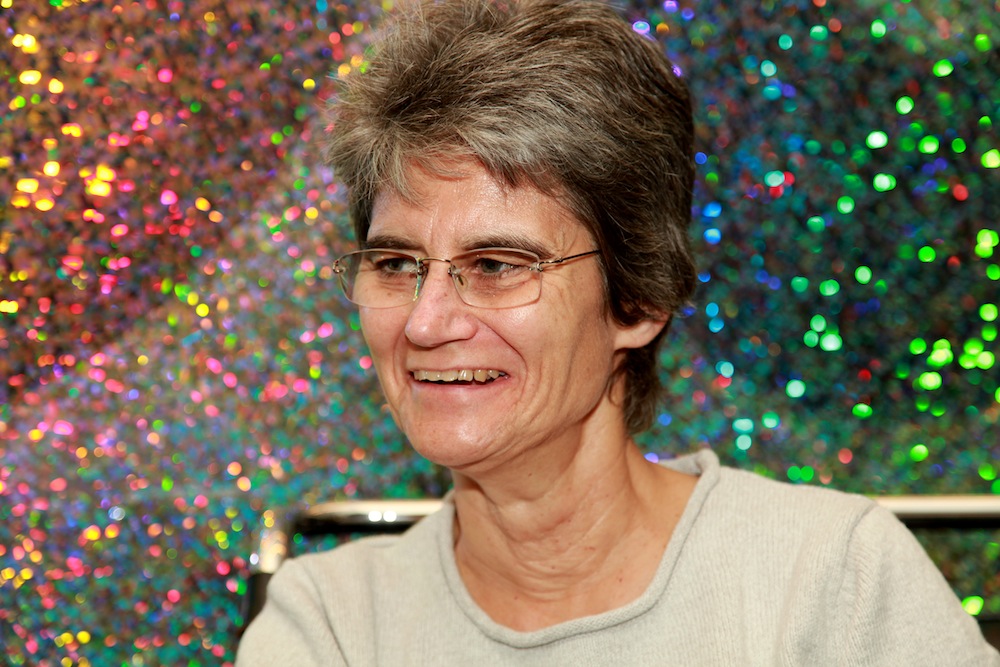
Bettina Boxall is the water and environmental reporter for the Los Angeles Times. Before moderating a panel on how California and the world can learn to live with less water, she offered a warning in the Zócalo green room: If you know what’s good for you, you won’t mention “California’s water wars” in her presence.
What’s the most beautiful part of non-urban California?
I love the Eastern Sierra. It’s incredibly dramatic: the Sierra comes down in these vertical cliffs, the contrast between the valley and the height, and just the austere beauty of it. That’s my favorite part of the landscape of California.
What keeps you up at night?
Oh, pick your topic! It can be anything from the collapsing state of the newspaper industry to the collapsing state of the environment to my cat’s ill health to a friend’s problems. Lots of things can keep me up at night. Last night I woke up because I saw the film Gravity, and a couple of images kept on coming back to me, the floating untethered through space.
What’s the last great book you read?
Cutting for Stone. It’s a novel based in Ethiopia with two twins. On a number of levels—of bringing you into a different world, questions of personal responsibility, being unmoored from your upbringing—it was very well done, and I thought a very memorable novel.
Who was your childhood hero?
This is going to sound a little weird, but Albert Schweitzer. I can still remember this photo, it was probably in Life magazine, of him with a cat overlooking his papers. I love pets, and I loved that photograph, and I think one of my earliest ambitions was to go to Africa and work for Albert Schweitzer.
Do you know any poems by heart?
No. I’m actually too literal. I’m not a poem person. I get impatient—please, what is the point? So I’m very much in awe: There’s a woman, a vendor at the Hollywood farmers market, which I’ve been a faithful attendee of ever since it was founded 20 years ago, and she has a poem store. You just go up, and she writes poems instantaneously on a typewriter and hands them to you. I’ve never asked her for one, but what I hear from people who have is they’re very good, and I really admire that.
How do you take your coffee?
Black with sugar. Strong, dark. Please, no cream, no milk.
What’s your favorite cliché?
I guess I’ll turn it around and say one of the clichés that drives me the craziest is—I write about water—“California’s water wars.” I get so sick of hearing about California’s water wars.
If you didn’t cover the environment, what would your beat be?
Covering the environment is one of the things that’s kept me in journalism. I’ve worked for newspapers for something like 37 years now, and so I’m well beyond the stage where I want to write about anything that comes down the pike. I’m not sure I would still be a journalist if I wasn’t writing about environmental issues. I just want to be a specialist at this point.
What’s your greatest vice?
It’s not that I don’t have them. It all depends on your perspective of vicedom. I have a sweet tooth. My favorite morning at work at the Los Angeles Times is every Friday, editors bring in doughnuts and take them to the city desk, so I always head straight to the city desk and a doughnut on Friday mornings.
What’s the closest you’ve ever gotten to a fire you’ve been covering?
Very close. Actually I have vivid memories of the 1993 Malibu fire, and that was before I was covering the environment or writing about wildfire on a regular basis. The city editor came over and said, “There’s a fire, it started in the San Fernando Valley, and it’s going to burn all the way to the sea.” I thought, you’re nuts, you’re crazy. I was sent out, and it did indeed in the course of an afternoon burn all the way to the Santa Monica Mountains. This was before cell phones and Blackberries and all that stuff. You had to use landlines to phone information in. I spent 36 hours up straight—had to walk past police barricades, walk past the PCH, which we couldn’t drive up, walk along the beach by the water. I was just across PCH from burning hills. I still remember the orange glow coming out of the canyons and seeing deer at night with nowhere to go perched on the edge. When you cover the endless Malibu fires you get very, very, very close because they’re just across the street.
What’s something that very few people know about you, or would expect about you?
That at times I can be sentimental. I don’t think most people who know me would expect that. Certainly most people at work wouldn’t expect that.



